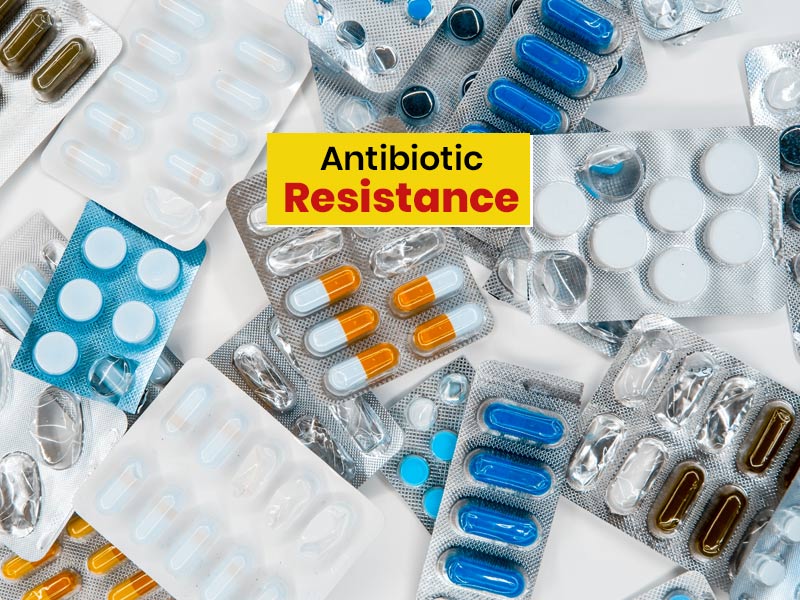
Antimicrobial resistance (AMR) claimed a staggering 12.7 lakh lives across 204 countries in 2019, as per a research published in The Lancet. It’s more than the deaths caused by cancer and malaria. Not just that, an estimated 49.5 lakh deaths that year were linked to this phenomenon. As the term loosely explains, AMR is when microorganisms such as bacteria, viruses, and fungi develop resistance to drugs, developed to kill them. The result: the infections caused by these either become too difficult or impossible to cure. Among the AMR-caused deaths, 70% were due to antibiotic resistance. Not just that, out of the 23 bacteria studied, just 6 were linked to over 35 lakh deaths. So what is antibiotic resistance? How does it develop? And what can we do to prevent it? To seek answers to these questions, Onlymyhealth spoke to Dr Mohit Mathur, Principal Consultant, and Head, Dept of Critical Care Medicine, Max Hospital, Gurugram.
Table of Content:-
What Is Antibiotic Resistance?
Penicillin, developed in 1928, was the first antibiotic the world saw. Since then, antibiotics have revolutionised the field of medicine and saved countless lives. However, due to “indiscriminate and injudicious use”, several bacteria developed resistance to these drugs, rendering them ineffective, leading to the phenomenon called antibiotic resistance. The issue is compounded by the fact that very few antibiotics are in the pipeline of pharma companies, Dr Mathur said.
How Do Bacteria Develop Resistance To Antibiotics?

(Photo Credit: Unsplash)
Whenever bacteria is exposed to an antibiotic:
- They develop and activate various defense strategies against the drug to survive.
- Their DNA instructs them to make specific proteins that either do not allow the antibiotic into the cell, pump it out of the cell, or destroy the drug.
- It’s not uncommon for the bacteria to employ more than one defense mechanism against the antibiotic.
- Not just that, bacteria have also developed ways to share their resistance mechanisms with other bugs that haven’t even been exposed to the drug.
Also read: India Third COVID Wave: How To Protect Kids From Coronavirus Infection
Antibiotic Resistance: Effect On Health
It is wrong to think that antibiotic resistance wouldn’t affect us, Dr Mathur said. It would just be a matter of time when we would be exposed to this “nightmarish” situation when a loved one admitted to a hospital for a simple infection would find it hard to recover as available drugs might not work against the bug. Also, antibiotics kill the good bacteria in your body that help us with many vital functions of the body.
How To Prevent Antibiotic Resistance?

(Photo Credit: Unsplash)
‘Using antibiotics the right way’ is the key to preventing resistance. Many times antibiotics are prescribed for treating infections. But do you know, most common infections like the common cold, flu, most sore throats, many ear infections, coughs, or bronchitis are caused by viruses, and antibiotics are ineffective against them? Hence, taking antibiotics for these might do you more harm than good. It might also increase your chance of getting an infection later that might not be cured with an antibiotic. Hence, when sick, seek early medical care and take medicines as prescribed by the doctor. Do not self-medicate.
Right Way To Use Antibiotics To Save Yourself & Community From Antibiotic Resistance
Here is what Dr Mathur recommends:
- Take antibiotics as prescribed by a certified doctor.
- If you have concerns regarding antibiotic resistance, communicate that to your doctor.
- When your doctor prescribes a drug, take it as per the prescription and complete the full course.
- Throw away leftover pills and don’t save them for future use.
- Never take antibiotics prescribed for someone else.
Also, take proper care of your hygiene to prevent catching infections in the first place. It will save you from taking drugs, thus preventing antimicrobial resistance.
Also read: Antimicrobial Resistance Simplified: Here Are 3 Things You Should Know
How Do Doctors Tackle Antibiotic Resistance?
Antibiotic resistance is a major menace that can put several lives at risk. There are ways we can prevent it from happening. Similarly, doctors too take steps to prevent it. Such steps include monitoring rationale antibiotic prescription, stopping antibiotics as soon as the infection is cured, antibiotic stewardship programs, among others.
(With inputs from Dr Mohit Mathur, Principal Consultant and Head, Dept of Critical Care Medicine, Max Hospital, Gurugram)
Photo Credit: Unsplash
Also watch this video
How we keep this article up to date:
We work with experts and keep a close eye on the latest in health and wellness. Whenever there is a new research or helpful information, we update our articles with accurate and useful advice.
Current Version